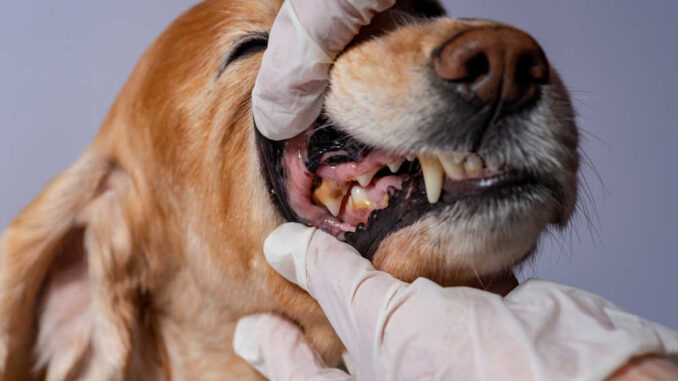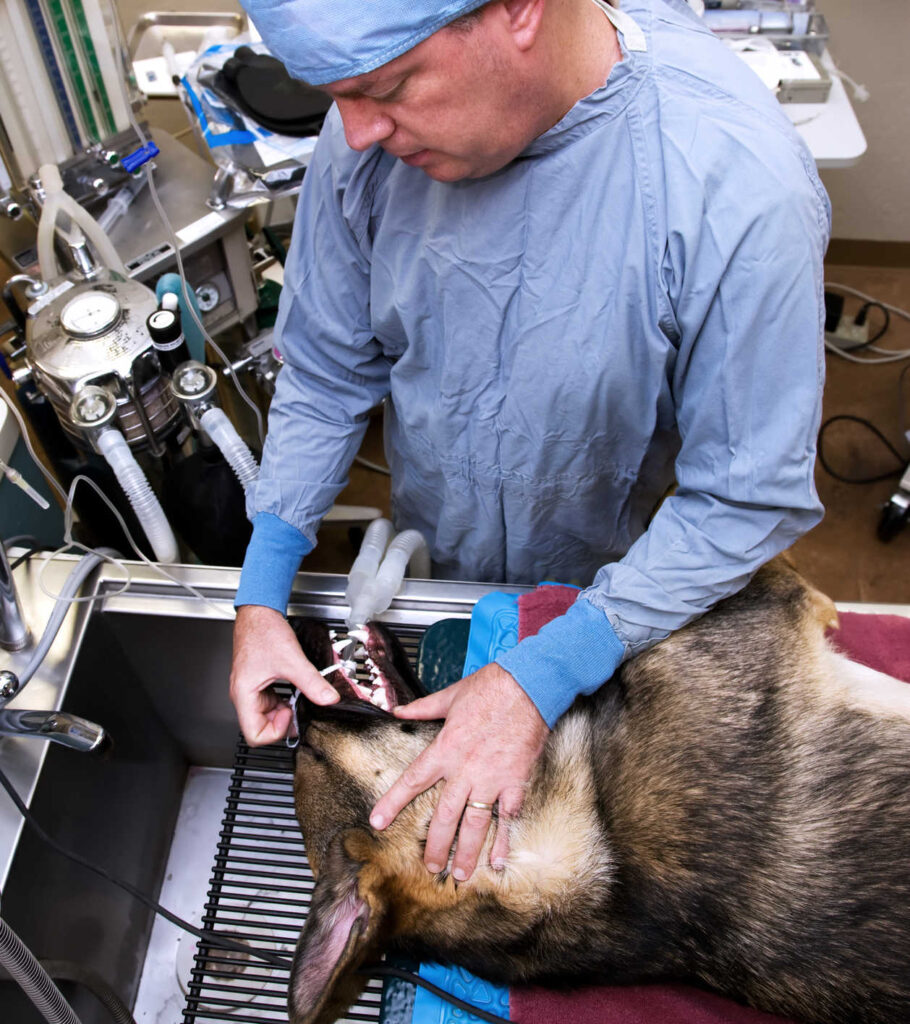
This article was updated on December 4th, 2022
As an emergency veterinarian, I see my fair share of dental emergencies. I have witnessed countless dogs with broken jaws, avulsed teeth, or broken teeth. Just the other day, a dog presented to me after completely avulsing its canine tooth. The entire root was dislodged and the tooth was hanging on by the gums alone. These poor owners were distraught and it was suspected the tooth got caught on their other dog’s collar. This pup was young and his owners wanted to save the tooth by all means. I worked diligently to replace the tooth and put him on appropriate pain medication. The next day, our veterinary dentist splinted the tooth and the hard work was done. If these owners would have waited, the tooth would not be able to be saved.
In this article, we will review how dogs typically break their teeth, the signs that your dog’s broken tooth needs veterinarian attention, and when exactly a dog’s broken tooth is an emergency.
How do dogs break their teeth?
There are a few extremely common reasons dogs can break or traumatize their teeth. Knowing these risks, we can work diligently as pet owners to try to prevent damage from occurring.
- Chewing Hard Items: Bones and antlers are not appropriate chew toys. This is one of our dentist’s biggest pet peeves. He has had to repair so many teeth simply caused by aggressive chewing on hard items
- Trauma: Many teeth are broken secondary to trauma. This may be a common occurrence after dog fights, vehicular trauma, falls, or interactions with wildlife
- Behavioral issues: Dogs that are prone to chewing their crates or damaging items in the home are very prone to breaking teeth. I see this most commonly in dogs with separation anxiety.
- Untreated Dental Disease: Moderate to severe dental disease causes bone loss and tooth decay. The affected teeth are weaker than normal and dogs may break or lose teeth with normal chewing habits. I see this commonly in small breed dogs
Signs you need to schedule an appointment with your veterinarian

Now that we understand the common causes of broken teeth, we also need to know when to seek veterinary care. Dogs with chronic dental diseases that break or lose teeth generally do not require emergency veterinary care. Dogs with old fractures or chipped teeth do not require urgent care. If your dog has broken a tooth and is not bleeding, is comfortable, eating normally, and you have no interest in saving the tooth, then this is not an emergency. We will discuss below when broken teeth warrant an emergency trip.
6 signs you need to go to vet emergencies if your dog has a broken tooth
Sometimes broken teeth can be an emergency. These are some signs that you need to go to the emergency veterinarian right away:
- Pain – Any animal that has pain associated with a broken tooth should be evaluated by a veterinarian. Signs of pain include poor appetite, not chewing normally, drooling, reluctance to play, rubbing their mouth, and lethargy.
- Blood – A small amount of bleeding can be expected after a tooth is removed or broken, but moderate to severe, persistent bleeding requires intervention.
- Evidence of infection – If your dog has traumatized their mouth in away way and has a foul odor or discharge, this may indicate an infection. Infections require prompt treatment and intervention by a veterinarian with antibiotics.
- Instability of the jaw – Causes of broken teeth can also cause jaw fractures. Any dog that has evidence of a malaligned jaw or inability to chew normally should be evaluated by a veterinarian ASAP. Jaw fractures are extremely painful and require stabilization.
- Inability to close the mouth – I’ve seen teeth come loose and prevent the jaw from closing normally. While this isn’t a dire emergency, it is painful to the animal and may prevent normal eating.
- You wish to save the tooth – Some owners feel very strongly about saving damaged teeth, especially in young dogs. Any recently traumatized tooth that has pulp exposure should be evaluated by a veterinary dentist ASAP if you wish to save the tooth.
What could happen if my dog needs emergency help, but we decide to wait to see our regular vet?
Waiting to seek veterinary help can have several disadvantages. If your dog is painful, this will increase the time they go without relief. Not only is this unfair to your pet, but they also may stop eating and drinking. If a tooth has significant trauma, waiting for care may increase the incidence of infection. Infection can travel down the tooth and into the jaw, leading to worsening pain or fractures. An avulsed or cracked tooth that is not immediately addressed will lose viability. If it is your goal to save the tooth, seek care ASAP.
What is the prognosis for dogs with broken teeth?
Typically excellent! Dogs generally fare just fine after experiencing broken teeth as long as medical intervention is sought within a reasonable time frame. This means you should schedule a timely appointment with your veterinarian to have said teeth evaluated and likely removed.
The prognosis for the teeth is variable. If prompt care is sought from a veterinary dentist, many teeth can be saved. The longer you wait to seek care, the less likely a tooth can be saved and extraction will be needed.
Veterinary treatments
What is the cost of veterinary treatment for a dog with broken teeth?
Treatment costs for broken teeth can be quite variable depending on the treatment sought and who is performing the dental care (veterinary dentist vs general practitioner). Dental care for pets is generally still quite expensive because anesthesia, dental x-rays, and specialized equipment are needed. Be wary of any facility that does dental cleaning and extractions without providing general anesthesia or does not perform dental radiographs.
The cost of treating a dog with a broken tooth at your regular veterinarian’s office.
Dental evaluation and extractions at your general practitioner’s office will likely be less expensive than at an emergency or referral facility. Most anesthetized dental exams range from $500-1000 and all extractions are additional to that. Sometimes the cost of extractions varies by the tooth damaged, as canines and molars are exceptionally difficult to remove. With severe dental disease, staged dental procedures may be needed, so you should expect to spend several thousand throughout treatment.
The cost of treating a dog with a broken tooth at an emergency veterinary hospital.
Emergency veterinary services are more expensive than those provided by your general practitioner. An exam alone ranges from $100-200. Pain medications and antibiotics rarely cost more than $200. If sedation and surgical intervention are needed, expect a bill of anywhere from $1000-1500 depending on the severity of the injury.
It is very important to understand that emergency veterinarians are not dentists and often will not perform dental radiographs or involved extractions through the ER. If a tooth is loose and easily removed that is one thing. If a tooth is well seated and requires special equipment to remove, an emergency veterinarian is unlikely to perform this procedure.
With jaw fractures or dental emergencies where the owner wants to save the tooth, the emergency veterinarian will provide pain management and antibiotics as needed. Ultimately, your pet will need care provided by a surgeon or a board-certified veterinary dentist. This type of care typically costs several thousand dollars so it is important to be prepared for unexpected emergencies. This is why prevention is so important!
Pet insurance is pivotal for this very reason. We never want to be stuck unable to afford care when an emergency arises. It cost me around $2500 to have my dog’s tooth removed after she broke it on a bone. Granted, I sought care from a veterinary dentist so the cost was higher. Luckily, I had insurance that covered the cost of her extraction. I received a reimbursement check for her care and we were both happy in the end.
Final words: about dog’s teeth
Dogs are known for having some of the toughest teeth around. Their ancestry has led to them having strong canines and exceptionally sturdy molars. This is because hundreds of years ago, dogs used these teeth to hunt, fight, and eat their prey.
Today’s dogs are extremely different from dogs in the past. Each breed has a different head and mouth anatomy as bred by humans over hundreds of years. Our working and protection breeds generally have the strongest teeth and jaws, while toy breeds have daintier mouths. Despite these confirmation changes, dogs are still known for having extremely durable teeth.
For this reason, there is a common misconception that dogs should be provided with hard chew items to satisfy their needs. I see many owners giving their dogs femur bones, antlers, and marrow bones. I used to love giving my dog bones to chew on. It wasn’t until she broke her molar that I learned my lesson the hard way and had to have her tooth removed.
Disclaimer: This website's content is not a substitute for veterinary care. Always consult with your veterinarian for healthcare decisions. Read More.


Be the first to comment